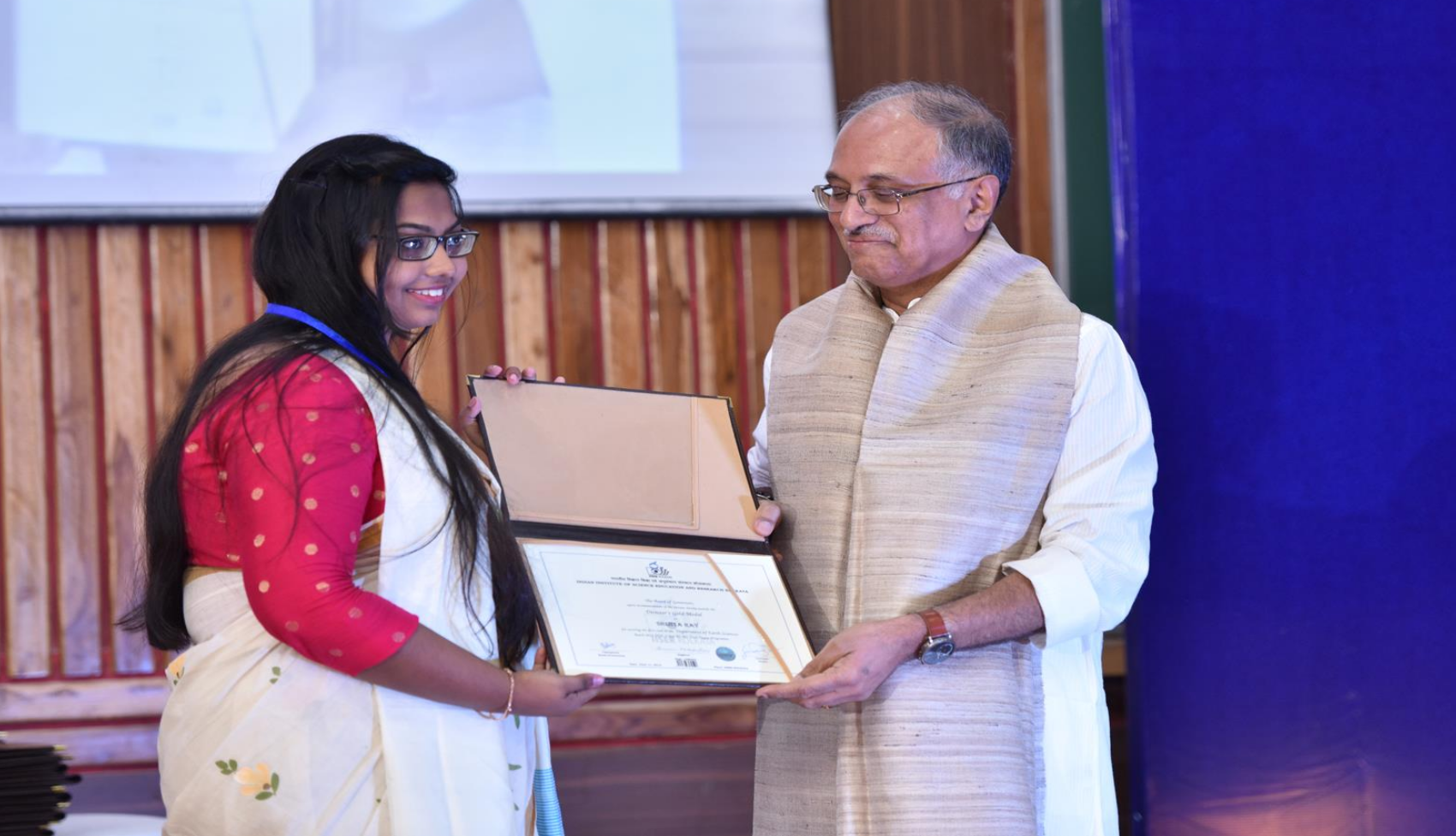
In Conversation with IISER Alumni Srijita Ray
Srijita Ray’s path from IISER Kolkata to a PhD at the Australian National University was anything but conventional. Initially drawn to chemistry, she found her true passion in earth sciences, leading her to one of the world’s top experimental petrology labs. Now set to join Rice University as a postdoc, she aims to bridge academia and industry in critical mineral research. Her journey proves that stepping beyond traditional choices can open doors to incredible opportunities. For students at IISER, her story is an inspiring reminder to explore fearlessly and follow curiosity wherever it leads.
SS: Hello. Didi. So, you have had a remarkable journey, I believe, in IISER, Kolkata.
SR: Yes.
AD: So, you are 15 MS.
SR: No, I am 14 MS.
AD: 14 MS! So, you graduated here in 2019. That means when you just graduated, the 19MS batch of BSMS first entered IISER Kolkata.
SR: Yes.
SS: I believe the IISER Kolkata campus was not here back then as it stands now. Right?
SR: When I started my journey at IISER, Nivedita Hostel wasn’t there yet. However, the LHC was! In fact, during our first year, construction for the LHC had just begun.
So, as you all know, we did our classes at Lecture Hall 4, the great LH4. The upstairs canteen is now located there.
SS: Mess, as we call it, today.
AD: Can you walk us through the progression of the facilities during your time at university?
SR: Sure! Most of our classes were held at the LHC in our second year. By the time we reached our fourth or fifth year, the RC was ready, but the TRC was still under construction. So, for a while, the RC and LHC were quite similar regarding available facilities, but the TRC wasn’t yet in the picture.
 Dr. Ray is, at the time of this interview, a postdoctoral associate in the department of Earth, Environmental and Planetray Sciences, Rice University.
Dr. Ray is, at the time of this interview, a postdoctoral associate in the department of Earth, Environmental and Planetray Sciences, Rice University.
AD: So, just to clarify, the RC was up and running, but the TRC wasn’t available yet?
SR: Yes, exactly. The RC was available, but the TRC wasn’t. It can be tricky sometimes to remember the exact timeline, especially after all these years, but that’s how it unfolded.
SS: When you first came to IISER, did you think you would go towards earth sciences or petrology?
SR: No, no, not at all. Initially, I thought I would choose chemistry. Before coming to IISER, I had attended another college for about a month. The curriculum had already started there, and I had enrolled as a chemistry student. So, when I shifted to IISER after being selected, I thought I would also continue studying chemistry here.
But as you know, in our first year, we have to study all the subjects. All the subjects. That is true for you guys as well, I believe. So, after that time, I was introduced to Earth Science and I liked the subject. But, still, I was confused.
So, in the second year, I took Chemistry and Earth Science. And then, in the third year onwards, I chose to.
AD: So, did you have ECB as your premajor?
SR: No, not ECB. PCE. Physics, Chemistry, and Earth Science.
SS: The same goes as well as for my roommate. But he is now in Physics.
AD: So, what fascinated you about petrology? And, Petrology is associated with petroleum… ?
SR: No, no, petro means rocks. It is associated with rocks, and the formation of rocks. Not anyway related with Indian Oil and Bharat Petroleum.
AD: No, not that. What I meant is, that is the norm we think about and come across.
SR: So, It is actually difficult to say and pinpoint any particular reason. I think the way teachers taught us and the books, those things were, I mean, I really enjoyed reading the books or the classes were very like, what should I say, very good. Interesting.
 Monazite crystal from SiO2- Srijita Ray worked on this crystal.
Monazite crystal from SiO2- Srijita Ray worked on this crystal.
SS: So, in those days, did you have SDG?
SR: No.
SS: You did not have him?
SR: No. So, we studied petrology under Tapobrata Sir.
SS: Tapobrata Sarkar.
SR: Yes, and I think Somnath Dasgupta, sir, came when I was doing my master’s thesis. Before that, he was the Vice-Chancellor at Assam University in Silchar.
SS: So, after leaving IISER, where have you been? Where did you pursue your PhD?
SR: I pursued my PhD at the Australia National University in Canberra, Australia.
And there I finished my PhD this year very recently.
SS: So, normally, I mean, from where my partner Aritra and I stand, we see, the main target is either the USA or Europe. We both are from the Department of Physical Sciences.
I mean, I am taking the UK in Europe only. So, mainly these two places. Australia National University does come to mind, but it comes mainly for that internship purpose.
But to pursue PhD, I do not think a good chunk thinks of Australia or other places. So, why did you?
SR: Yes, actually, because I was more inclined to the experimental side of petrology.
And, if you know, the experimental petrology labs are not very common. So, in the USA, I think only a few places have experimental petrology labs. And in Australia, actually, ANU has a very big experimental petrology lab.
That’s why, when selecting universities, ANU was one of my top choices, primarily because of the excellent experimental setup there.
 Old campus of Indian Institute Of Science and Educational Research Kolkata, back in 2014.
Old campus of Indian Institute Of Science and Educational Research Kolkata, back in 2014.
SS: So, like Europe, you applied to a professor and got it or like the USA, you applied to an institute?
SR: No. So, like in Europe, I had to email some professors, and they conducted interviews with me. After that, I had to go through the application process and complete all the necessary steps before finally getting selected and enrolment.
SS: So, in your view, how are the Australian academic system and the Indian academic system somewhat similar or somewhat different?
SR: In the Australian academic system, we do not have to do any coursework.
So, directly we would like to enter the research as an RA, or Research Assistant.
AD: So, that is what postdocs do here.
SR: No, no. So, you may have heard that in the USA, when you enter, there is a TAship, and you would be working as a teaching assistant and then later on the student will get the RA, which is basically the research assistant. It is the same here as well.
SS: So, that means that at that time, you are getting the scholarship from the research and not from your teaching.
SR: So, in Australia, directly you will enter the RA, and you will not like to do any teaching courses. So, you did not have to do a TA. It is kind of optional.
As for my case, I did like a little bit of TAship duty, but that was an optional exercise. So, I just did it for my experience. Thus, the question that you asked earlier was how the academic systems in Australia as compared to India.
So, I would say that in Australia, the work-life balance is better.
 Earth Sciences Laboratory, where Srijita Ray worked at IISER Kolkata.
Earth Sciences Laboratory, where Srijita Ray worked at IISER Kolkata.
AD: Better in the sense?
SR: Better in the sense, I mean, maybe for example in Australia, after 5 o’clock or after 4.30, nobody will, or rather should I put this in this way, technically should not send you any official email or communicate. And, in my whole PhD, I never get any kind of official email from either my supervisor or my professor, co-supervisor, or anyone after 5. So, these kinds of things were there.
SS: In India, we all get important mail at midnight. Yes. And we submit our assignments also at 12.
SR: I am not sure about the assignment deadline there because I never submitted that. So, basically, here I did more coursework, and there I did research. So, I would not compare it like that. Actually, it will be difficult for me to compare. Yes. But this is a kind of thing, I think in Europe also this balance is very much maintained, but in the USA, this is not and maybe not in India as much as well.
AD: Yes.
SS: So, did you give any admission interviews in universities other than ANU?
SR: In Australia? No. In Australia, I just gave an interview at ANU.
AD: In other places?
SR: In Europe, I gave, I think, an interview at a university in France, but I forgot the name.
SS: Is there any fundamental difference between the interview process in Europe and Australia?
SR: No. The interview process is very similar. So, in Europe, the principal supervisor and the co-supervisor asked me questions, and that was one round only, and in Australia also the same.
 Srijita Ray with Prof. Tapabrato Sarkar and collegues.
Srijita Ray with Prof. Tapabrato Sarkar and collegues.
SS: What about the funding sources in Australia? So, the funding source is like a university can fund you, or if a professor has your fund, then that is a wa,y or there is another way like the government you can get funded.
AD: Australian government?
SR: Yes, the Australian government.
SS: And is that a handsome amount or just when you want to sustain yourself?
SR: No, no. Actually, the amount that you will get is sufficient to pay your rent and then like to have food and everything, and after that also you can save some money. So, it is not a very big proble,m and also in Australia, the scholarship is tax-free. So you do not need to pay taxes. So, that is a plus point. That is a boon compared to other places.
SS: If you do not take it personally, I have heard from some teachers, petrology has no such future because petrology is mainly used in places like where the oil industry is very much associated. If you say region it is the Middle East or Russia. If you say company it is Oman oil, Indian Oil ,and similar.. So, in the upcoming 100 years, it is going to be a dead subject.
You, as a new researcher, how do you see this comment?
SR: Well, I think actually I do not fully agree with this one because I mean you know about the renewable energy sources like the critical minerals. So, I mean those are, so it is very important to like to extract those in a cheap and economic way, and right now actually China is the, I mean one of the main suppliers for the overall world. So, basically in order to understand how we can extract those critical minerals and to understand their basic science, we need to understand and we need to go through the petrology.
So, in that way, actually, it is very useful, and I can say, in places like Australia, we do have lots of these rare earth mineral ores, and like many of the petrology labs are now trying to understand how they can extract those ores more cheaply. So, not only China will supply the world with those minerals, but other countries, rich in natural resources, can also take part in the game. For that, knowledge, fundamental research, and the development of technology are the utmost requirements of the time. So, in that way, I do not think that petrology is dying or something.
SS: So, now coming to little away from the academics, we have had COVID-19 and perhaps many of us not have seen the video we have come across a story, an incident where a doctor, student, or scientist is crying, accusing the world of saying. “Now Why don’t you ask all the celebrities to fund you or to save you? For society, doing science and fundamental research is a thankless job?”
I mean, have you heard or seen?
SR: No. I have seen that during the COVID. It is not in India, and it is somewhere else.
 Crystallization of monazite from a SiO2 bearing carbonate melt at 1275 ºC, 20 kbar using piston-cylinder instrument- her phD work.
Crystallization of monazite from a SiO2 bearing carbonate melt at 1275 ºC, 20 kbar using piston-cylinder instrument- her phD work.
SS: I mean, where we were all looking towards doctors and scientists for the doctors for the immediate cure to save the lives and scientists for mainly biologists, scientists. Yes, for the medication. For the medication, but then this came up.
So, this kind of situation perhaps does not fall directly on earth scientists, but as a member of that society, it is, again, I mean scientific society, budding researcher. How do you see this? Do you feel that we, as budding researchers, are doing something thankless?
SR: In science, especially when working in basic research, it can be very challenging to communicate your work to those outside the scientific community. People may not immediately see the value of your research and might even think of it as unimportant or insignificant.
However, in science, progress is often made incrementally, step by step. So, if you’re doing basic science research—whether in Chemistry, Physics, or Earth Science—it can sometimes feel like a thankless job, especially during your PhD. However, as more people contribute to your work over time, the significance of your research becomes clearer. Eventually, others will recognize that it wasn’t a thankless job but rather part of a gradual, step-by-step process that advances knowledge.
I hope that answers your question.
SS: That is ok. As a part of that question, have you ever felt that it would have been better to pursue engineering than this? I mean, at your age when your friends who have opted for engineering might have found a lucrative job with a high-paying salary.
SR: Honestly, during my PhD, I questioned myself several times—pretty much every day, if not more often. But now, as I’m nearing the end, having submitted my thesis and everything, I feel differently. It seems that what I was doing was the right thing after all.
Regarding the question of freedom or independence, I don’t necessarily see it as having the “upper hand.” Still, in academia, there’s a certain autonomy that allows for deeper exploration and understanding. For instance, in engineering, many people pursue a PhD and take on similar challenges, but there’s a difference in the kind of work they do compared to those in academia. Engineers working a 9-to-5 job might not have the same opportunity to contribute to the deeper theoretical understanding that comes from academic research.
Another point is that, in academia, there is typically more freedom in terms of time—like vacation flexibility—compared to a corporate job. So, while there are challenges, freedom and independence are valuable aspects of the academic path.
SS: So, in your view or not exactly your view in reality, how does the funding in India and Australia differ?
SR: To be honest, I am not very sure about the Indian funding.
So, for me, it was basically the panel member or the supervisor. So they have already funded the project and where I joined.
So, that’s how I was a part of that funded project throughout my PhD. I didn’t have to write the proposal and like to bring the funding. So, that’s why maybe I was not aware of this funding situation or other things.
 Australia National University in Canberra, University in which Srijita ray pursued her PhD.
Australia National University in Canberra, University in which Srijita ray pursued her PhD.
SS: See, the fact is that is why I am asking this for the Australian case. Yes your scholarship was tax-free. Scholarship is tax-free in India also, but keeping it as a scholarship, there are other things you have to very much important your funding for your project and all.
And for the last few years, especially after this year, I mean the import duty and GST and whatever added together gave more than 150 percent in India. Are you aware of that?
SR: No.
SS: Ok. So, this is the present scenario. In this way, if the price goes up I mean that is that is the scenario in India I mean after the budget and all. So, how do you see I mean is there any kind of similar scenario in Australia? What is your view on this?
SR: I am not very sure about this topic because I was unaware of the budget or the present situation.
AD: Ok, never mind. Have you ever felt that, despite the changing times, the challenges faced by the scientific community have mainly remained the same—especially when it comes to attacks from various parts of society?
For example, after COVID-19, former U.S. President Donald Trump stated that the United States would no longer be a part of the WHO, claiming that the organization was not acting under his wishes. Similarly, there have been instances where the U.S. has been allowed to violate environmental laws with minimal repercussions, often just paying a small amount of money, as if doing the world a favor. On the other hand, lower- and middle-income countries, especially in the Global South—such as those in Africa and South Asia—don’t have the same privileges and often face harsh consequences for similar actions.
In South Asia, countries like India, Pakistan, Bangladesh, and Nepal still experience practices that undermine science and rationality. For example, there are cases of witch-hunting, where people, often women, are accused of being witches and subjected to violence. Malpractices in medicine also persist, with people resorting to quacks and superstitions. Even the practice of alchemy still exists in some places.
Furthermore, institutions like IITs and IISERs often suffer from inadequate funding. And unfortunately, there are still sections of the world that believe in discriminatory practices, such as apartheid, and argue that certain groups can’t become better scientists or contribute to research as effectively as others.
Given all this, do you feel that the attacks on science and the scientific community persist, even today?
SR:, To be honest, I never felt, never felt that.
SS: So, after this PhD, what’s your plan?
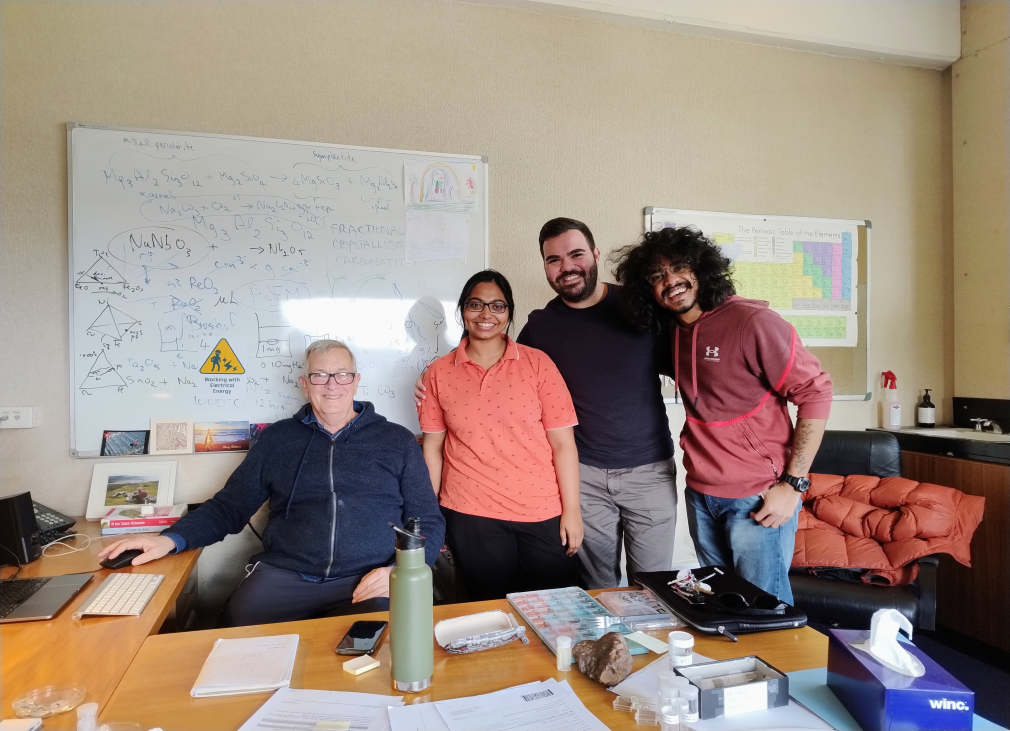 Srijita Ray with her PhD supervisor (Prof. Greg Yaxley) and some other colleagues.
Srijita Ray with her PhD supervisor (Prof. Greg Yaxley) and some other colleagues.
SR: So, I will join as a postdoc at Rice University in Texas. So, and that’s a period of? For two years. After that? After that, basically, basically, I want to explore the industry as well because I have never been totally in academia like throughout.
So, I wanted to explore the industry, but I also wanted to open both of my options in academia and industry.
AD: Yes. Now, you are moving to the US. We hope that you will have plans to come back to India.
SR: Yes.
AD: So, now, lame question. Assume you are the president and the prime minister of the country. So, what changes would you, I mean from sitting today, in today’s position, would you like to see so that the differences that you can see between the USA and India can be moved, rubbed out, rubbed off?
SR: So, maybe first, I would like to put more money into industries.
SS: What kind of industries?
SR: I would like research, so I may want to put more funding in the critical minerals or in the renewable energy or green technology in that sort of thing in India.
So, if someone wants to come back, we only have maybe IIT, IISERS, IACS, and a few institutes. Some of the DST and department of science.
So, maybe I will try to increase the number of central government institutes.
SS: So, now a follow-up question comes in: if more industry has to come up, are we not falling prey to some kind of thing in the hands of the businessmen? In the present case, if not in India, there are also other countries where, compared to the lower middle class, industries tend to govern and direct the ways science should work.
SR: I mean applied science, engineering science if you know engineering science fully, some application-based sciences, not fundamental discoveries or stuff like that. Also, they may be inclined towards some, something where. But I mean, when I am saying industry, it is not always like that. Research industries and national labs are included as well.
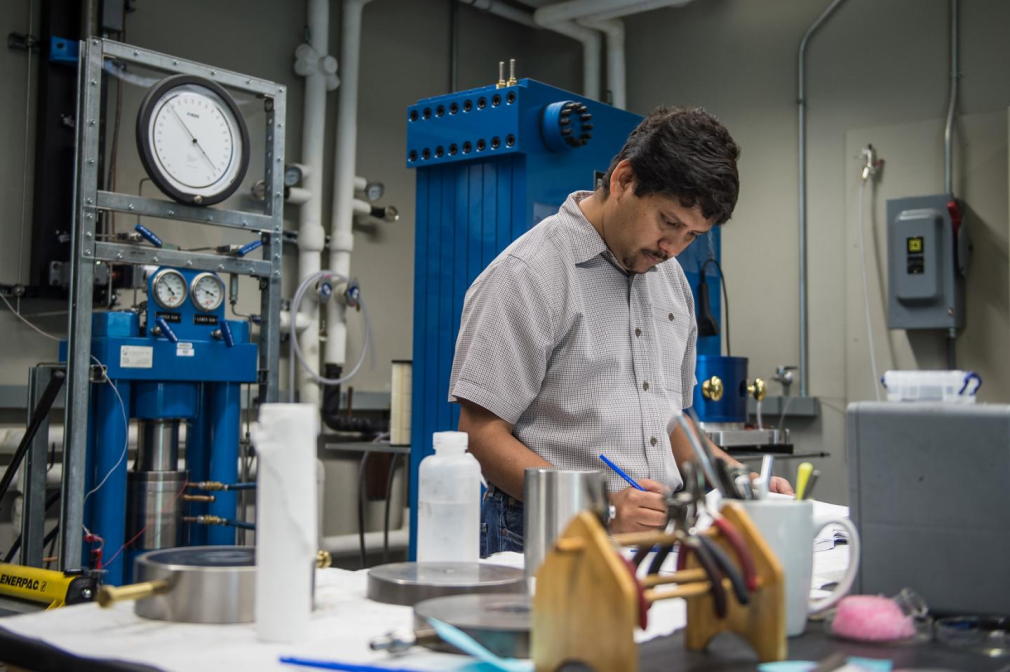 Professor Rajdeep Dasgupta under whom Srijita Ray is working currently under in Rice University, Texas.
Professor Rajdeep Dasgupta under whom Srijita Ray is working currently under in Rice University, Texas.
SS: So, national labs. Again, coming back to academia, right?
SR: So, the national lab is a link between academia and industry. So, it is not like full academia, or it is not like the entire industry.
So, it is kind of a link or bridge between these two. And like there are, I mean, there are other industries in the USA, which is more like research industries. Of course, there is a part of a business team.
But I think it is not business. I am not sure if I answered it satisfactorily.
SS: No. That is fine. I just wanted your opinion in this regard.
AD: So, what, if we finally come towards the end of the thing, will your advice to your fellow juniors in IISERs be?
SS: How many students used to be in earth science departments in your days?
SR: I think I had 32 in my batch.
SS: Really?
SR: Yes.
AD: Have you ever thought why earth science shows these fluctuations where physics and biology, departments show all-time high demands? Chemistry is not high demand, but it is a fair good moderate every year.
SR: I think it is because we learn physics, chemistry, biology, and mathematics from childhood. So, people usually like when they come here, they usually already love either physics or mathematics or chemistry like that, and they usually go there.
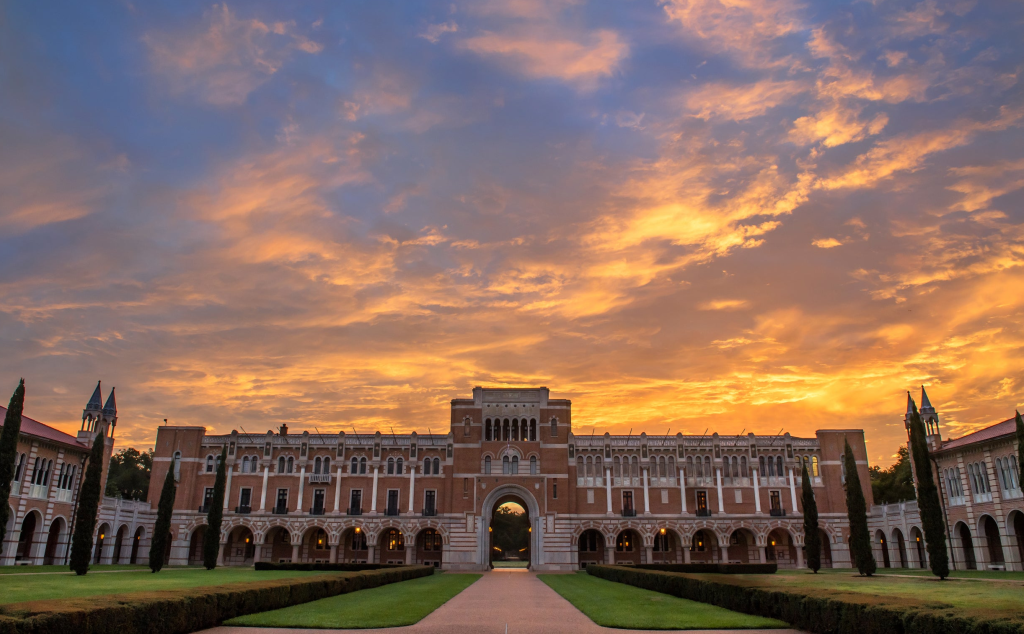 Srijita is currently working as a Postdoctoral Associate in the Department of Earth, Environmental, and Planetary Sciences at Rice University in Houston, Texas.
Srijita is currently working as a Postdoctoral Associate in the Department of Earth, Environmental, and Planetary Sciences at Rice University in Houston, Texas.
AD: In Australia, it was not a hostel life, right? You had to stay in apartments?
SR: So, in Australia, we stayed in studio apartments.
So it was a big room with your kitchen and bathroom, everything. And then, like at the side, you have another room with a kitchen and bathroom. So there was no sharing.
AD: So, is it one bedroom, one BHK type?
SR: Not BHK because there was no partitioning between the kitchen and bedroom. So it is kind of, so studio apartment is kind of arranged. For example, if this is like one room, then this side is the kitchen, and this side is the bathroom. The bathroom is the door, if you were asking that.
And one side has the bed.
SS: And what was the cost of staying there?
SR: So since I stayed on campus, that’s why I had to pay… On campus means like us? Yes. So that’s why I had to pay around $1200. I mean $1200 for a month.
SS: And how much did you earn? I mean, if you don’t mind.
SR: Yes, I get around 4,000 per month.
AD: 4000 per month. So you could save 1000?
SR: Yes, the saving was fine.
SS: Okay, so with this we conclude. Thank you.
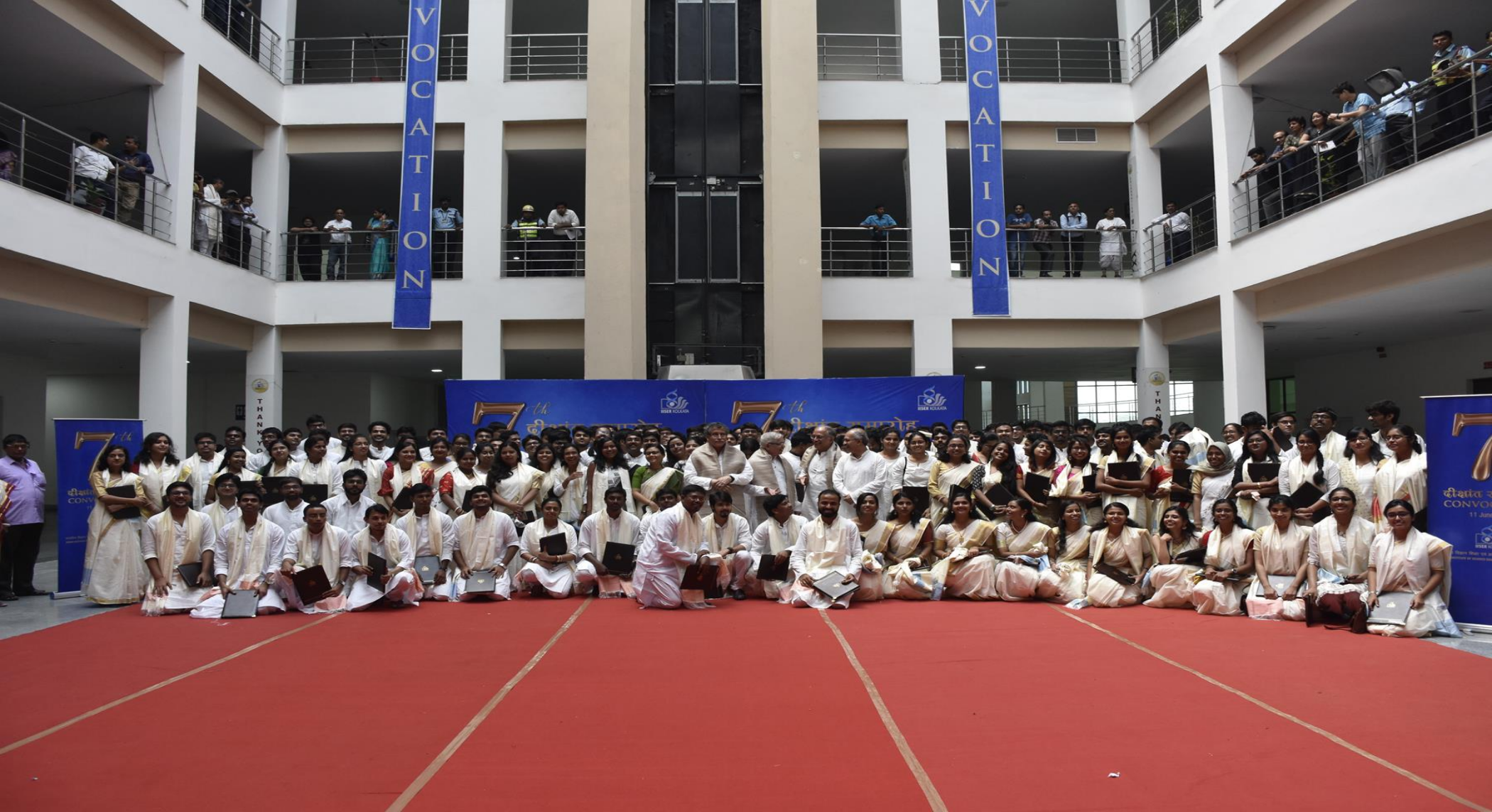 14MS group photo on convocation 2019, Srijita and her batch mates one last time all together.
14MS group photo on convocation 2019, Srijita and her batch mates one last time all together.